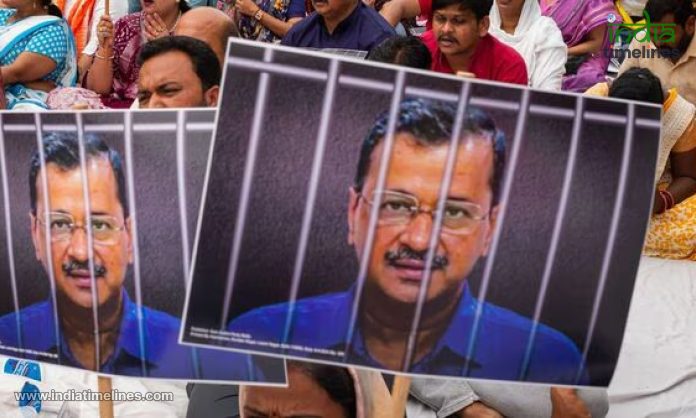
Arvind Kejriwal, the Chief Minister of Delhi, has taken his case to the Supreme Court after the Delhi High Court dismissed his petition contesting his arrest in connection with irregularities in Delhi’s excise policy. Kejriwal is challenging the High Court’s decision and seeking legal recourse at the highest judicial level. This move comes amidst ongoing legal battles surrounding the allegations of misconduct in Delhi’s excise policies.
Arvind Kejriwal, the Chief Minister of Delhi, found himself embroiled in legal proceedings when the Enforcement Directorate (ED) arrested him on March 21 in connection with a case concerning irregularities in Delhi’s excise policy. This development marked a significant escalation in the ongoing legal saga surrounding allegations of misconduct within the administration’s handling of excise policies.
Subsequently, on a recent Tuesday, the Delhi High Court rendered a pivotal decision, rejecting Kejriwal’s plea challenging the legality of his arrest by the ED in connection with the excise policy case. In its ruling, the court asserted that Kejriwal’s arrest did not transgress any legal boundaries and, therefore, could not be deemed “illegal,” a stance that encompassed the decision for remand.
Meanwhile, reports from ANI unveiled insights from Advocate Rishikesh Kumar, who serves as counsel for the Delhi Chief Minister. Kumar highlighted that the court’s ruling was subject to challenge in the apex court, emphasizing their prerogative to pursue such recourse. He iterated, “We have contested the unlawful apprehension of Arvind Kejriwal. The High Court, in its deliberations, affirmed the legality of the remand order and further justified the grounds for the arrest. These were the conclusions drawn by the High Court in its recent verdict. Given the amenability of this decision to challenge in the Supreme Court, we await its formalization. Once the detailed verdict is made available, we intend to expeditiously mount a challenge before the Supreme Court.”
This sequence of events underscores the complexity and gravity of the legal battle surrounding Kejriwal and the allegations leveled against him regarding the excise policy irregularities. The decision by the Delhi High Court not only validates the actions taken by the ED but also underscores the legal standing behind the arrest and subsequent remand order, as determined by the court.
For Kejriwal and his legal team, the rejection of their plea represents a setback, prompting them to consider the option of escalating the matter to the Supreme Court. Their stance indicates a determination to exhaust all available legal avenues in challenging the perceived injustice and contesting the legality of the arrest.
The forthcoming challenge before the Supreme Court is poised to intensify the legal battle and shed further light on the intricacies of the case. It presents an opportunity for a comprehensive review of the legal arguments, the evidence presented, and the interpretation of relevant statutes and precedents. Moreover, it underscores the significance of the judiciary in adjudicating matters of public interest and upholding the principles of justice and fairness.
In the broader context, Kejriwal’s legal predicament reverberates beyond individual culpability, encapsulating larger questions about governance, accountability, and the rule of law. The allegations of irregularities in Delhi’s excise policies strike at the heart of public trust and confidence in the administration’s ability to uphold ethical standards and safeguard the interests of the citizenry.
As the legal proceedings unfold, they serve as a litmus test for the integrity of the justice system and its capacity to address allegations of wrongdoing at the highest echelons of power. The outcome of the impending Supreme Court challenge will not only shape Kejriwal’s political trajectory but also reverberate across the political landscape, influencing perceptions of accountability and transparency in governance.
In navigating these turbulent legal waters, Kejriwal and his legal team confront formidable challenges, including the burden of proof, the intricacies of procedural law, and the scrutiny of public opinion. Yet, their resolve to pursue legal recourse underscores a commitment to upholding the principles of justice and defending the rights of the accused.
Ultimately, the saga surrounding Kejriwal’s arrest and the subsequent legal battle epitomizes the delicate balance between power and accountability in a democratic society. It underscores the imperative of robust legal mechanisms to safeguard the rule of law and ensure that justice is served impartially, irrespective of one’s position or political affiliation. As the case unfolds before the highest court of the land, its implications will resonate far beyond the confines of the courtroom, shaping perceptions of governance, integrity, and the enduring quest for justice.
The bench presided over by Justice Swarna Kanta Sharma made a significant observation regarding the arrest of Arvind Kejriwal by the Enforcement Directorate (ED). According to the bench, the ED possessed substantial evidence that warranted Kejriwal’s arrest. Furthermore, Kejriwal’s failure to cooperate with the investigation and the resulting delay were also impacting individuals already in judicial custody.
The court emphasized that the legality of Kejriwal’s arrest and subsequent remand should be evaluated based on legal considerations, rather than the timing of elections. It dismissed Kejriwal’s challenge regarding the timing of his arrest, particularly in light of the upcoming General elections, noting the absence of any malicious intent on the part of the ED.
Evidence gathered during the ED’s investigation suggests Kejriwal’s involvement in a conspiracy and active participation in the utilization and concealment of proceeds of crime. This evidence implicates him both personally and in his capacity as the convenor of the Aam Aadmi Party (AAP).
The repeated assertion by the court underscores its position that Kejriwal’s arrest and subsequent legal proceedings must adhere strictly to the principles of law and justice. The court’s emphasis on evaluating the case objectively, without being swayed by extraneous factors such as political timing, reinforces the importance of upholding the rule of law and maintaining the integrity of legal processes.
In light of these observations, Kejriwal’s attempts to challenge the timing of his arrest, particularly in the context of impending elections, are deemed untenable by the court. The absence of any evidence indicating malicious intent on the part of the ED further weakens Kejriwal’s argument in this regard.
The court’s remarks serve as a reminder of the fundamental principles underlying the judicial process: fairness, impartiality, and adherence to legal norms. By reaffirming the need to evaluate Kejriwal’s arrest and remand based solely on legal grounds, the court reinforces the notion that justice must be dispensed without fear or favor, regardless of the political climate or personal affiliations of the individuals involved.
Moreover, the court’s acknowledgment of the evidence gathered by the ED implicating Kejriwal in a conspiracy highlights the gravity of the allegations against him. The suggestion of his active involvement in the utilization and concealment of illicit funds underscores the seriousness of the charges and further underscores the importance of a thorough and impartial investigation.
As the legal proceedings unfold, it becomes increasingly apparent that Kejriwal’s legal challenges are likely to face an uphill battle. The court’s unequivocal stance on the matter, coupled with the weight of evidence presented by the ED, presents a formidable challenge for Kejriwal and his legal team.
In conclusion, the court’s observations regarding Kejriwal’s arrest and the subsequent legal proceedings underscore the fundamental principles of justice and fairness that underpin the judicial process. By emphasizing the need to evaluate the case based on legal considerations, rather than political timing, the court reaffirms its commitment to upholding the rule of law and ensuring that justice is served impartially and without prejudice.

































